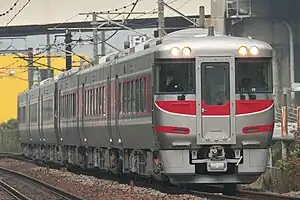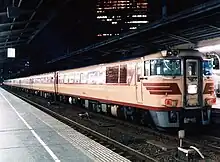Hamakaze
The Hamakaze (はまかぜ) is a limited express train service in Japan operated by West Japan Railway Company (JR West), which runs from Osaka to Kasumi and Tottori.[1]
 KiHa 189 series on a Hamakaze service, November 2010 | |
| Overview | |
|---|---|
| Service type | Limited express |
| Status | Operational |
| Locale | Tokaido Main Line, Sanyo Main Line, Bantan Line, Sanin Main Line |
| First service | 15 March 1972 |
| Current operator(s) | JR West |
| Former operator(s) | JNR |
| Route | |
| Termini | Osaka Kasumi, Tottori |
| Stops | 21 |
| Distance travelled | 214.5 km (133.3 mi) (Osaka – Kasumi) 264.8 km (164.6 mi) (Osaka – Tottori) |
| Average journey time | 3 hours 30 minutes approx |
| Service frequency | 3 return workings daily |
| On-board services | |
| Class(es) | Standard class only |
| Disabled access | Yes |
| Seating arrangements | 2+2 |
| Sleeping arrangements | None |
| Catering facilities | None |
| Observation facilities | None |
| Entertainment facilities | None |
| Other facilities | Toilets |
| Technical | |
| Rolling stock | KiHa 189 series DMUs |
| Track gauge | 1,067 mm (3 ft 6 in) |
| Electrification | None |
| Operating speed | 120 km/h (75 mph)[1] |
| Track owner(s) | JR West |
Stops
Trains stop at the following stations:
Osaka – Sannomiya – Kobe – Akashi – (Nishi-Akashi) – (Kakogawa) – Himeji – Fukusaki – Teramae – Ikuno – Wadayama – Yōka – Ebara – Toyooka – Kinosaki-Onsen – Takeno – (Satsu) – Kasumi – Hamasaka – Iwami – Tottori
- Only the Hamakaze No. 5 stops at Nishi-Akashi and Kakogawa.
- Trains also stop at Kakogawa and Satsu during winter.
Rolling stock
New 130 km/h KiHa 189 series 3-car DMU sets were introduced on Hamakaze services from 7 November 2010.[2]
Prior to November 2010, services were operated by 4-car KiHa 181 series DMU formations, lengthened to 5 or 7 cars in busy seasons.[1]
 KiHa 181 series on a Hamakaze service on the Bantan Line, February 2009
KiHa 181 series on a Hamakaze service on the Bantan Line, February 2009
Formations
As of 2021, trains are formed as shown below, with car 3 at the Osaka end.[3]
Hamakaze 1 – 6
| Car No. | 1 | 2 | 3 |
|---|---|---|---|
| Accommodation | Reserved | Reserved | Reserved |
| Facilities | Wheelchair-accessible toilet |
- All cars are standard class.
- All seats are reserved.
- All cars are no-smoking.
- Trains run as 6-car formations during busy periods.
History

The Hamakaze service was introduced by Japanese National Railways (JNR) on 15 March 1972.[4]
All cars were made no-smoking from 1 June 2009.[5]
References
- JR新幹線&特急列車ファイル [JR Shinkansen & Limited Express Train File]. Japan: Kōtsū Shimbun. 2008. p. 92. ISBN 978-4-330-00608-6.
- 特急「はまかぜ」新型車両展示会の開催について [Details of new "Hamakaze" train display] (in Japanese). JR West. 10 September 2010. Archived from the original on 14 September 2010. Retrieved 16 September 2010.
- "はまかぜ:JRおでかけネット". jr-odekake.net. Retrieved 9 October 2021.
- 列車名鑑1995 [Train Name Directory 1995]. Japan: Railway Journal. August 1995. ISBN 978-4-330-00608-6.
- 在来線特急列車などの全席禁煙化ならびに在来線ホームの禁煙化の拡大について [Expansion of no-smoking on trains and platforms] (in Japanese). JR West. 26 March 2009. Archived from the original on 29 March 2009. Retrieved 16 March 2010.
External links
- JR West Hamakaze information (in Japanese)